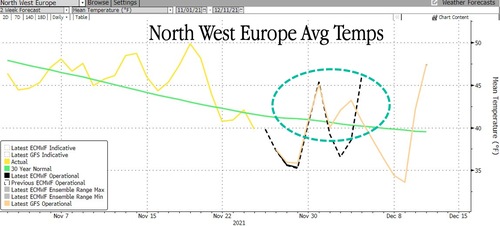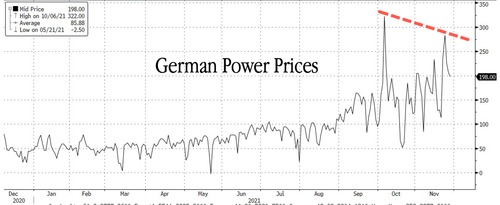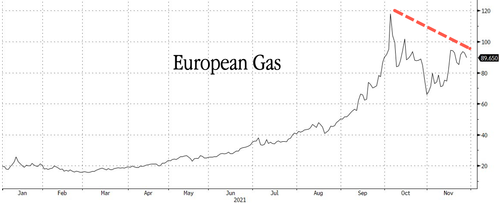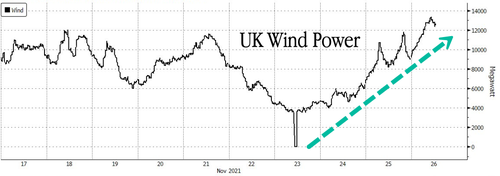Europeans To Save On Energy Bills As Mild Christmas Weather Forecasted
There’s good news for the millions of Europeans paying exorbitantly high prices for power and natural gas. That is the latest cold spell is set to diminish by Dec. 1.
Natural gas and power demand should decline as the latest cold snap in northwest Europe will ease by the middle of next week. Average temperatures for this time of year through Dec. 5 will be 3-5 degrees Fahrenheit above normal, ranging between 40-45 degrees.
Days ago, we noted the heating season arrived in northwest Europe as colder weather forced German day-ahead power prices to the second-highest level ever. Now power prices are fading as heating demand forecasts are slumping.
Benchmark Dutch gas for next month also dropped more than 3.6% to 89.65 euros a megawatt-hour.
There is more good news as alternative energy power sources, such as wind, in some parts of northwest Europe, particularly the U.K., have gone from zero power generation on Nov. 23 to more than 12,000 megawatts. Additional power will help alleviate natural gas markets that have been strained due to soaring demand and limited supplies. Bloomberg data shows wind is now on par with gas at 36% of the total power supply.
Maxar’s Weather Desk said warmer temperatures for the U.K., France, and Germany next week, while cold to persist in central Europe, adding below temperatures expected in the Nordic region.
Weather models (subjected to change) show another dip in average temperatures for northwest Europe between Dec. 5-10. Milder temperatures could be seen through mid-December.
And there’s more good news, Germany’s state weather agency is forecasting very mild conditions for the second half of the month across the entire country.
A new emerging concern is the worsening COVID-19 situation. Andrew Hill, head of European gas analysis at BloombergNEF, said, “it is unclear as to exactly what this means for gas demand,” since some previous lockdowns saw a “double heating effect,” with both homes and offices heated simultaneously.
Readers already know that European natural gas stockpiles are the lowest in nearly a decade as Russian flows have been lackluster. Last week, German regulators suspended the approval process for the Nord Stream 2 pipeline, meaning any new gas flows from the pipeline are unlikely this heating season.
So the good news is that millions of Europeans will observe warmer weather next week, but then a short-lived cold bast will give way to milder temperatures through the first half of December. This means more savings on power bills and possibly gives Europe some ability to build more natural gas stockpiles before the next cold blast.
Tyler Durden
Sat, 11/27/2021 – 07:35
via ZeroHedge News https://ift.tt/3oYw6ha Tyler Durden



